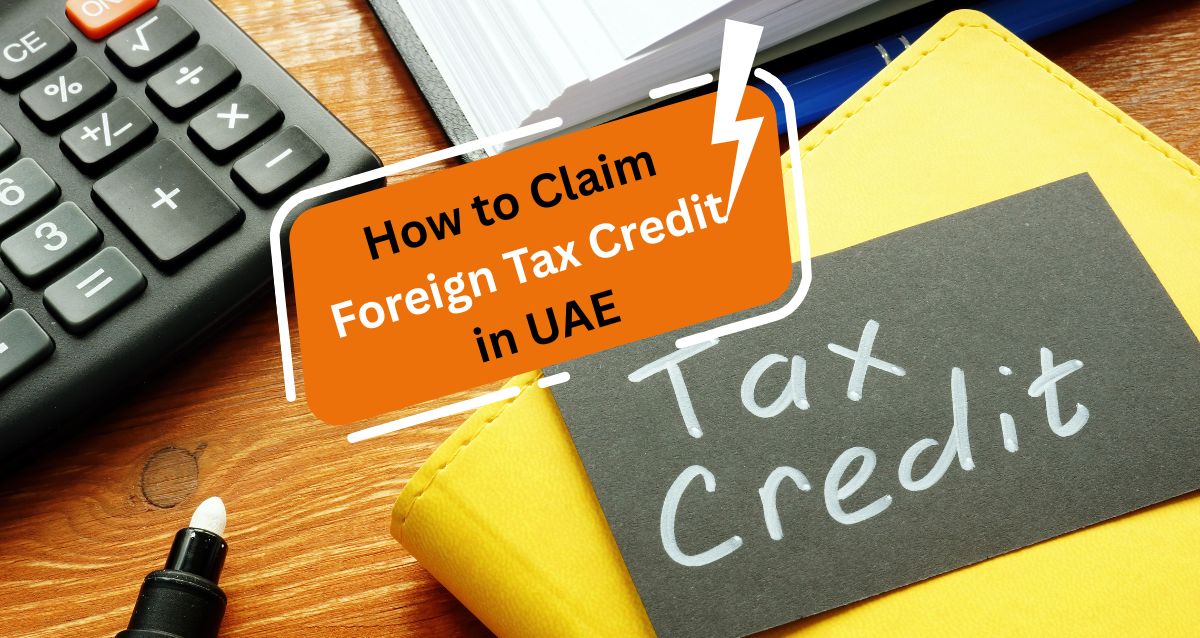Claim Foreign Tax Credit in UAE
Background
In case the company have global operations, it may earn income from multiple countries. If you are a resident taxable person in the UAE, you will be subject to taxation on income earned both in the UAE and on the income which is generated from another country. To avoid double taxation on the same income, the UAE allows you to claim a foreign tax credit for taxes paid in other countries when filing your corporate tax return. This credit reduces your UAE Corporate Tax liability by the amount of tax already paid abroad, thereby preventing double taxation.
Let's discuss in detail when foreign tax credit could be claimed
Which Foreign Taxes can be claimed in the UAE as Corporate Tax Credit?
To be eligible for a Foreign Tax Credit in the UAE, the foreign tax should be similar to Corporate Tax and meet these conditions:
1. It must be imposed by a foreign government (federal or state).
2. Payment of the foreign tax is mandatory and enforced by the tax laws in that foreign country.
3. The tax should be on profit or net income (income minus deductions). Foreign tax withholding also counts.
It is always important to consider the Double Taxation Agreement (DTAA) to figure out which foreign taxes can be used for the Foreign Tax Credit.
Foreign Taxes which cannot be claimed for UAE Corporate Tax Credit
Any tax which is a consumption-based tax, import taxes/duties, any transaction taxes, property and wealth taxes which are levied on assets in another country, not income, estate or inheritance taxes.
Tax Credit of Income as well as non-income elements
In some cases, there could be some taxes which are similar to corporate tax and have taxes based on both income and non-income factors (such as Zakat in KSA, levied on the equity, retained earnings, and net income). In certain cases, if it is in the nature of income tax and splitting of the non-income factor is difficult, it can still qualify for the UAE Foreign Tax Credit, provided all the amounts meet all the conditions mentioned.
Foreign Tax Credit should specifically not include - Payments like interest, fines, or penalties to a foreign government are not considered income taxes and do not qualify for the UAE Foreign Tax Credit.
When is Foreign Tax Considered "Paid"?
For the UAE Foreign Tax Credit, you can claim it for foreign tax 'paid,' which means either the amount has been paid to the respective foreign tax authorities or the amount is payable to authorities, i.e. you owe them, not yet paid, but it's committed.
But the tax amount is not considered as 'paid' if the tax liability in the foreign country is uncertain, or the tax paid has been refunded or it is confirmed refundable.
What if the Foreign Tax paid outside the UAE is refunded after claiming credit in the UAE
If Foreign Tax Credit has been claimed but later receives a refund for such tax in the foreign jurisdiction, or the available Foreign Tax Credit is reduced. A voluntary disclosure to the FTA would be required based on the change in the amount of Corporate Tax Payable.
In case a change in FTA increases the tax liability by more than AED 10,000, the person should submit a voluntary disclosure to the FTA within 20 business days from the date of becoming aware of the foreign tax repayment.
If the increase in tax liability is AED 10,000 or less, the person should correct the Foreign Tax Credit claim either in the Tax Return due for a previous period or in the Tax Return for the period in which the foreign tax is refunded.
On the other side, if the foreign tax paid increases after claiming foreign tax credit, then the person can submit a Voluntary Disclosure along with a Corporate Tax refund application, and the FTA will assess the impact on the person's corporate tax position.
Calculating Foreign Tax Credit
The Foreign Tax Credit in the UAE cannot exceed the Corporate Tax due on the relevant foreign income. It's calculated as the lower of the actual tax paid in the foreign jurisdiction and the Corporate Tax due on the foreign source income.
Tax Credit doesn't apply to exempt income like foreign dividends under the UAE's Participation Exemption, even if foreign taxes were withheld. It's also not available if the taxpayer is in a loss position according to the UAE's Corporate Tax Law.
In the UAE, where there are two Corporate Tax rates (0% and 9%), the tax on foreign income is calculated using a weighted average formula: i.e.
Corporate Tax on foreign income = (Corporate Tax on total income before any Foreign Tax Credit) * (Relevant foreign income) / (Total income).
Unused Foreign Tax Credit
Unused Foreign Tax Credit in the UAE cannot be carried over to future tax periods or applied to earlier ones; it simply expires. Additionally, there's no option to deduct the unutilized Foreign Tax Credit from taxable profits. Once it's not used in the relevant period, it cannot be reclaimed or offset against future or past tax liabilities.
Multiple Foreign Credits
The Foreign Tax Credit is specific to each "relevant" foreign income, calculated separately for each income source. Excess Foreign Tax Credit from one source cannot offset Corporate Tax due on another source.
When is Foreign Tax Credit Not Available?
- No Foreign Tax Credit if no Corporate Tax is payable due to Small Business Relief election or turnover below AED 1 million.
- Similarly, no Foreign Tax Credit if foreign source income is from a Qualifying Free Zone Person (subject to 0% Corporate Tax).
- If a taxpayer incurs a loss (negative Taxable Income), and no Corporate Tax is payable, no Foreign Tax Credit is available even if foreign tax was paid on the income
Documents Required for Claiming Foreign Tax Credit
A Taxable Person is required to maintain all necessary records for the purpose of claiming a Foreign Tax Credit. The records maintained by
The Taxable Person should include all of the following details:
- Foreign income taxed abroad (in foreign currency)
- The exchange rate used to convert income to AED
- Financial year of the income
- Nature and amount of foreign tax paid
- Date of foreign tax payment
Acceptable evidence of foreign tax payment includes:
- Official receipt from the foreign tax authority
- Withholding tax certificate from the foreign authority
- Filed tax return with income and tax calculations
- Confirmation letter from the foreign tax authority stating that all taxes have been paid
To learn more about How to Claim Foreign Tax Credit in UAE?, book a free consultation with one of the Flyingcolour team advisors.
Disclaimer: The information provided in this blog is based on our understanding of current tax laws and regulations. It is intended for general informational purposes only and does not constitute professional tax advice, consultation, or representation. The author and publisher are not responsible for any errors or omissions, or for any actions taken based on the information contained in this blog.


